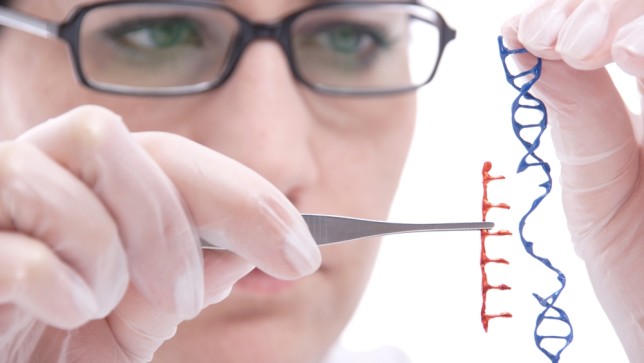Green MEPs Benoît Biteau and Martin Häusling have released a new report stating that new GM technology won’t solve the problems of industrial agriculture and will undermine nature, climate protection and the European Green Deal.

GM developers are promoting ‘gene editing’ as a way to save nature and the climate
Source: The Greens/EFA
In recent years, a range of genetic modification (GM) techniques have emerged that are referred to as ‘gene editing’. One of them is the much-hyped CRISPR/Cas ‘gene scissors’, whose inventors have been awarded the Nobel Prize. The GM seed industry is claiming that we cannot miss out on this technology – which they call “plant breeding innovation” – if we want to make farming more sustainable, and reduce pesticide use in particular.
There’s no doubt that farming must become more sustainable. There’s no doubt also that there is an urgent need to reduce artificial inputs such as pesticides and fertilizers. But telling us that GM is a way to get there? Seriously?
If you want to reduce chemicals, don’t look to those who make them
GM companies have always told us their products would reduce the need for agrichemicals. Even as recently as 2014, Monsanto said on its website that “GM crops can provide farmers with the means to … reduce pesticide applications”.
So far, the opposite is true. In countries that embraced GM technology, pesticide use has increased faster than elsewhere. In Brazil, pesticide consumption grew by nearly 200 percent between 2000 and 2010. More than half of all pesticides are used on soya, over 95% of which is genetically modified to withstand spraying with herbicides such as glyphosate. Globally, glyphosate use has risen almost 15-fold since so-called “Roundup Ready” glyphosate-tolerant GM crops were introduced in 1996.
In these countries – more than everywhere else – farming operations were caught in a pesticide treadmill. The overuse of some pesticides led to the development of resistances in weeds and insects which led to the use of more and different pesticides and so on.
For the producers of GM seed, that’s not a problem. On the contrary, it makes good business sense. Remember, the four biggest GM seed producers – Bayer, Corteva, Syngenta and BASF – are all chemical companies originally, and they all produce agricultural chemicals.
Organic farming has the answers
As organic farmers, we know how to farm without synthetic pesticides. How do we do it? It’s through well-established practices such as long crop rotations with diverse plant varieties, the use of cover crops and by planting hedges that harbour predators of insects feeding on our crops. None of this is new, really, although these practices are continuously being developed, and more agronomic innovations are expected to come online in the future. In contrast to GM approaches, they do not create new environmental risks and uncertainties. On the contrary, they help to support and protect natural ecosystems.
Of course, robust crop varieties are important too, but there’s only so much that the crop plant itself can do, let alone a few genes in it. What companies selling seeds and pesticides will not mention is that it’s the overall approach that matters: the diversity of crop plants, closed nutrient loops and care for healthy ecosystems to produce healthy plants.
Uptake of GM seeds would hold back progress
Organic has been shown to enhance biodiversity, sequester more carbon and use less energy, contributing to climate protection. So it’s good that the European Commission and national ministers want to increase the farming area under organic production from 8.5 percent to 25 percent in just over 10 years. This will help to advance the EU’s green goals – bring back nature and reduce the use of chemicals that harm wildlife.
Using GM technology would undermine that objective. Organic farming must be free of GM organisms, by its own rules and by EU regulations. Wherever GM crops are grown it has turned out to be practically impossible to keep organic production free from GM contamination. Today, only a single GM maize variety is grown in two EU countries, Spain and Portugal, in a very small area. In Spain, organic farmers have given up growing maize after their harvests were contaminated.
Importantly, GM technology doesn’t only hurt organic farmers. The use of patented seed technology has accelerated the concentration of the seed industry, and we expect that new GM technology will lead to further consolidation. Right now, a few multinationals control a large part of our agricultural production. One of the outcomes is a steady decline in the diversity of farmed crops – when we need the opposite to keep up food production under conditions of climate change. Another outcome is that seed breeding is taken away from farmers who can breed robust crop varieties adapted to local conditions. This jeopardizes farmers’ professional and economic autonomy.
Rather than advancing sustainability, GM technology will just do the opposite. It will undermine the EU’s objectives of reducing pesticide use and boosting organic farming, whilst squeezing truly innovative approaches.
The GM seed industry is telling us fairy tales: don’t believe them
The story of GM’s “green” credentials is as old as GM technology itself. In its recent edition, it’s a story that is tailored to climate activists and the Green Deal Commission. And it’s not the only positive spin we’re told. Those who worry about food safety will hear that new GM technology is all “precise” and therefore safe. Those who think technology shouldn’t be in the hands of a few multinationals will hear that CRISPR/Cas is a “democratic” tool available to all.
As Greens, we have examined these claims and found them all to be myths, fairy tales. Our new publication “Gene Editing Myths and Reality” presents eight claims made by the GM seed industry and shows them to be at best misleading, and at worst deceptive. It provides good information for those who have never heard of gene editing and for those who think they know it all.


















